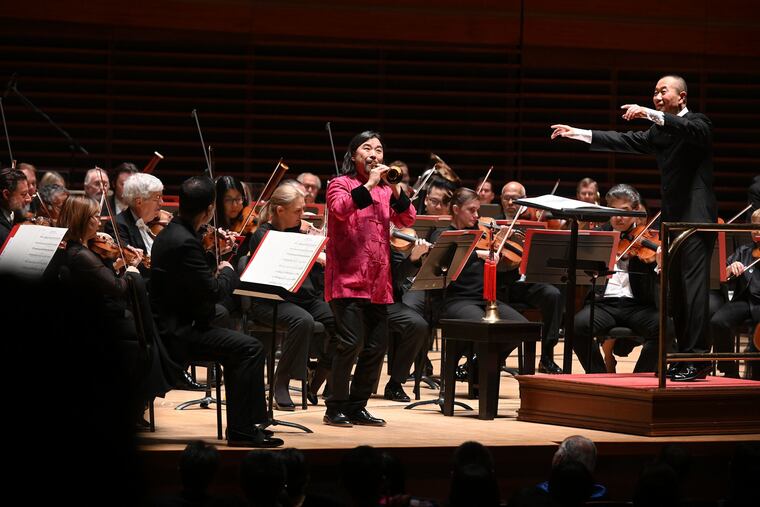Philadelphia Orchestra’s China Night navigates some tricky cultural crosswinds
Guest conductor Tan Dun lead a smooth, vivid, and ornate night of music despite a pro-Mao critique on Facebook that had challenged one program choice.

For all of the clouds that preceded the Philadelphia Orchestra’s China Night on Saturday at the Kimmel Center — murmurings of pro-Hong Kong protests, a momentary pro-Mao outcry over one concert program choice — the evening came off smoothly, vividly and as ornate as Chinese silk, though not an easy listen for all parties concerned.
Guest conductor Tan Dun, the Oscar- and Grammy-winning Chinese composer, brought together so many cultural strands that any given segment of the sold-out audience (full of small children, by the way) was likely to feel amiable puzzlement at some point or another.
West, east, pop, classical, and folk boundaries were all crossed and fused. That’s Tan’s world, even more than in his past visits here, which included the 2013 Nu Shu: The Secret Songs of Women, a multi-media harp concerto.
He tirelessly preserves dying folk traditions, though in his Hunan-province hometown of Changsha, pop versions of his music – dressed for success and fit for dance clubs – emanate from a state-of-the-art broadcast studio. Elements of all this created sounds perhaps never previously heard at Verizon Hall.
This was a cut above the infomercial-style displays of various countries’ cultural wares that are periodically seen at the likes of Carnegie Hall — government sponsored, with speeches, video travelogues, and more — and perhaps a new chapter in the history of China-America “soft power.”
It’s one of six concerts around the world commemorating the 70th anniversary of the People’s Republic of China, prompted by and produced from the China side but with a program that goes beyond nationalistic window dressing. Other cities participating are London, Milan, Tokyo, Toulouse, and St. Petersburg.
This particular China Night concert also comes on the eve of the orchestra’s brief Far East tour this fall, which will start in Taipei, Taiwan, on Oct. 31 and continue on to Japan and South Korea through Nov. 10.
In a preconcert news conference, Tan talked about music as a bridge — of course — but one that survives momentary bad weather, in an indirect reference to Rudolph Tang, a self-described expert on the classical music industry who launched a Facebook protest claiming the concert’s opening selection, John Adams’ fanciful The Chairman Dances, was a “mockery” of Mao.
The piece is an outtake from Adams’ freewheeling 1987 opera Nixon in China - which may never be done in the People’s Republic of China (“too prurient,” said veteran ambassador Nicholas Platt at the news conference) though The Chairman Dances, with no words and a tame, implied subtext, was something that Philadelphia Orchestra officials said they never even considered canceling.
The piece may have lived up to “musical bridges” platitude: The China Night audience responded well to its giddy rhythms, and perhaps more so than to the more abrasive opening of Tan’s Triple Concerto for piano, violin and cello, drawn from his Oscar-winning score to Crouching Tiger, Hidden Dragon.
Even when in Western classical mode, Tan tends to wave goodbye to tradition rather than follow it. The piece was basically a suite drawn from the score using the soloists (pianist Magdalena Baczewska, violinist Dan Zhu, and cellist Nie Jiapeng) as musical focal points, sometimes making dramatic effects, sometimes creating collages with contrasting but coexisting musical ideas.
Tan tends to write long and later cut back. And this needed to be cut way back.
The second half was lighter, though hardly insubstantial. Singer/composer Tan Weiwei sang Song Lines of China, with an earthy voice that wailed and growled, often accompanied by a 21st-century rhythm section. Words were spat out as much as they were sung, in ways you’d never expect from such a delicate stage presence.
Earthier still was Guo Yazhi playing the suona, a wind instrument that bleats, chortles, and does much in between in his 100 Birds Flying Towards the Phoenix. That was entertaining and virtuosic, even if you didn’t know the cultural backstory.
The piece that seemed most dispensable was Ye Xiaogang’s Cantonese Suite — pretty orchestra versions of folk songs — at least to these Western ears. Wrong: The man in back of me was moved to sing along quietly in Cantonese.
All of which might have seemed blissfully removed from trade talks, the banning of South Park, and all else going on between the U.S. and China.
Yes and no. Platt, the diplomat who aided in Richard Nixon’s 1973 visit to China and has helped the Philadelphia Orchestra on numerous tours, told me about the business-as-usual relationship between the two countries that goes on while heads of state are maneuvering.
“It’s like an iceberg,” he said. “What’s above the water line has a lot of sharp edges, but what’s below … keeps it steady.”